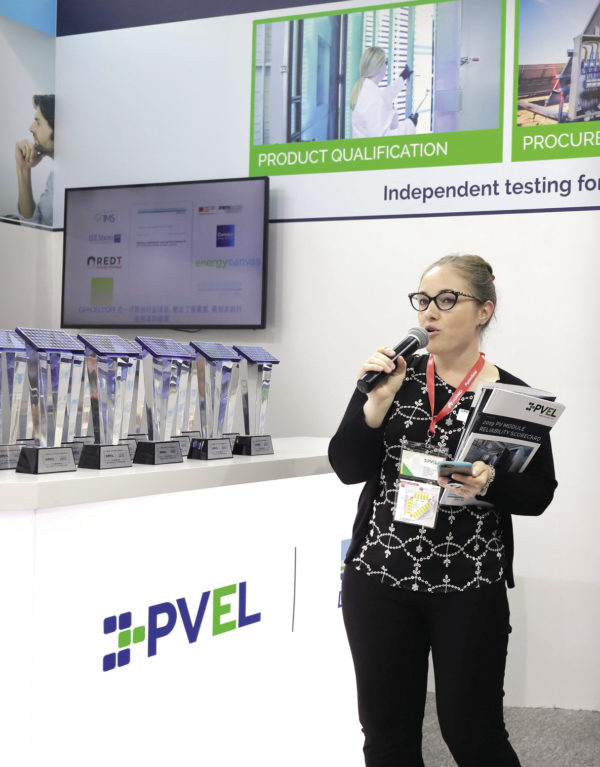pv magazine: PVEL initially started as a testing lab, was acquired by DNV GL, and then this year, spun off from DNV GL again. Can you talk about the evolution of the company and the recent spinoff?
Tara Doyle: We think of it as the chapters at PVEL. The first chapter was the formation and founding of PV Evolution Labs, which was started in 2010 by former reliability test engineers from a solar manufacturer. The founders realized that there was an immense need for third-party due diligence for the buyer market, and we quickly became the “lab of the downstream.” We were a small startup, working hard and playing hard – typical of the Bay Area, California, solar industry. We all did everything, and we were growing fast.
In 2014, we entered the second chapter when we were acquired by DNV GL, a huge global company providing independent engineering services across a broad spectrum of sectors, and we were in the [company’s] energy sector – which they were looking to grow and expand. We were a small part of a large infrastructure of engineering support and services. We operated under DNV GL for five years and experienced tremendous growth, especially our global reach, as the company has offices in 100 countries worldwide.
This January, we split out as an independent firm again and we are now in our third chapter. I would say now it is a mix of both environments. We are back to being a tightknit community, but we now have three facilities with four times the number of employees we had in the beginning. It is a mix of startup, close-knit environment of working hard, playing hard, plus this company that has grown tremendously with a massive global reach and a recognizable brand.

DNV GL is a very big company to break away from. Has there been an impact on your customers?
Many customers were shared between the core DNV GL and the lab. They still provide IE [independent engineering] services to the banks and developers, and studies for manufacturers, so since their core offerings are different than what PVEL is doing, we do and always have shared customers.
Now, we have more new services that are coming online. We have updated our test programs pretty substantially over the last six months or so. We have expanded our team to be able to support our expanded global network of customers. But beyond that, I would say that our relationships have not changed.
PVEL started with a scorecard for modules, and has now moved to inverters. What is the history and roadmap moving forward with scorecards?
One of the things that we thought would be really valuable in the market in 2013 was a scorecard that ranks PV products and models to shed light on which products are doing well. We published the scorecard to support the downstream, obviously, but we also intended to recognize the manufacturers with products that do well in testing. This year, we launched our fifth edition PV module scorecard. They’re evolving over time. The case studies, spotlights, our process, programs, best practices were all added to the scorecard as we learned of new needs, failure modes and challenges with PV power plants.
This year, we published the very first edition of our inverter scorecard (see pp. 68-69). The scorecard is a mixture of education and actionable data.
What is PVEL doing in the battery storage space?
Our product qualification programs include modules, inverters, and in 2016, we added one for storage. We have been testing storage products for three years now. We are doing diligence support and providing data to the buyer community, and distributors as well, in this case.
Storage testing is critical as a hugely growing segment in the global marketplace as prices drop. But with that growth comes a lot of unknowns. Solar+storage assets are brand new in the market, relatively speaking. They have not been around long enough for anyone to say with confidence that these products will last the life of their warranties, or that they will perform as expected in their specific applications and use cases for the lifetime of the solar plant.
Our specialization is identifying and quantifying risk through our testing programs. We have this extensive reliability and testing program that we offer for battery cells, modules and systems. We are continuing to provide the data that the market needs to understand the risk of highly complicated units that are being deployed like gangbusters (laughs) all over the world, which are not well known in terms of history of use in a solar plant.
What type of storage tests have you been running?
On the cell level, we are running 45 different tests. We are looking at various use cases, vocational profiles, ramp rates, state-of-charge, and temperature changes. We are simulating many different environmental conditions to validate these products by comparing testing results to the parameters of data sheets.
For system-level testing, we are looking at capacity, state-of-charge range, inrush current, determining operational bounds, AC interface, DC input, the battery management systems, and then overall validation of the system response. We are looking at roundtrip efficiency and different types of operational modes. Again, we are simulating many different environmental conditions that these batteries might experience in the field and putting them to the test to see what happens, and what the best-use case for the battery is.
Will there be a storage scorecard?
We plan to issue publications on storage in 2020. There will very likely be a scorecard in the near future.
This content is protected by copyright and may not be reused. If you want to cooperate with us and would like to reuse some of our content, please contact: editors@pv-magazine.com.



1 comment
By submitting this form you agree to pv magazine using your data for the purposes of publishing your comment.
Your personal data will only be disclosed or otherwise transmitted to third parties for the purposes of spam filtering or if this is necessary for technical maintenance of the website. Any other transfer to third parties will not take place unless this is justified on the basis of applicable data protection regulations or if pv magazine is legally obliged to do so.
You may revoke this consent at any time with effect for the future, in which case your personal data will be deleted immediately. Otherwise, your data will be deleted if pv magazine has processed your request or the purpose of data storage is fulfilled.
Further information on data privacy can be found in our Data Protection Policy.